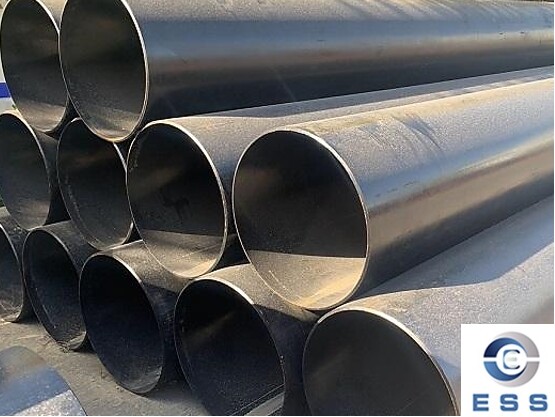
The circulating water system is an
indispensable part of industrial production. It involves the recycling of water
resources and is of great significance for energy conservation, emission
reduction and environmental protection. In this system, the choice of pipes is
crucial, and carbon
steel pipe has become the preferred material due to their many advantages.
Mechanical properties of carbon steel
pipes
1. High strength and rigidity
Carbon steel pipes have high strength and
rigidity and can withstand the stress caused by water pressure and temperature
changes in circulating water systems. This excellent mechanical property
ensures the stability and safety of the pipeline system and reduces the risk of
failure caused by pipe problems. In some high-load situations, the seamless
pipe is also selected to obtain higher load-bearing capacity and sealing
performance.
2. Reliable fatigue resistance
Long-term and repeated thermal expansion
and contraction place high demands on pipeline materials, and carbon steel
pipes can significantly improve fatigue resistance and extend service life
after strict process treatment.
Corrosion resistance of carbon steel
pipes
1. Anti-corrosion treatment technology
In the circulating water system, the water
may contain various chemicals and impurities, which requires the pipe to have
good corrosion resistance. Although the raw material is carbon steel, through
multiple anti-corrosion measures such as coating, anti-rust oil, heat treatment
and electroplating, it can still maintain high corrosion resistance when facing
acids, alkalis and impurities that may be contained in the water, extend
service life and reduce maintenance costs.
2. Adapt to variable water quality
The water quality of the circulating water
system is complex and changeable. Carbon steel pipes after professional
anti-corrosion treatment can work stably in various chemical environments,
extend the life of the pipeline, and thus reduce the long-term maintenance
costs of the enterprise.
Cost-effectiveness
1. Economic material selection
Compared with other types of pipes, such as stainless
steel pipes or copper pipes, carbon steel pipes have obvious advantages in
cost. Its price is relatively low, but its performance is not inferior.
Therefore, on the premise of meeting the use requirements, choosing carbon
steel pipes can save a lot of costs for the enterprise. For systems with
low-requirement working conditions, you can also consider using mild
steel pipe to further reduce cost on the premise of meeting performance
requirements.
2. Long-term economic benefits
In addition to the initial cost advantage,
the performance of carbon steel pipes in corrosion resistance and fatigue
resistance also means lower replacement and maintenance frequency, thus
bringing long-term economic benefits to enterprises.
Convenience of installation and maintenance
1. Standardized production and installation
Carbon steel pipes have mature
manufacturing processes and standardized specifications, which are convenient
for construction, splicing and installation, shortening the project cycle. Rich
usage experience and mature installation processes also make system
commissioning and maintenance more convenient.
2. Simple detection and maintenance
In response to common problems of carbon
steel pipes, the industry has established a complete set of detection and
maintenance standards, and regular maintenance can ensure the continuous and
efficient operation of the system.
Rich practical application cases
1. Power industry
In large power equipment such as thermal
power plants and nuclear power plants, circulating water systems are used for
cooling and heat exchange. Carbon steel pipes, with their high temperature and
high pressure resistance, can withstand continuous thermal shock after
anti-corrosion treatment to ensure stable operation of the system.
2. Chemical industry
The circulating water system of chemical
plants often needs to handle media containing corrosive chemicals. Carbon steel
pipes that have been treated with corrosion protection can still maintain
excellent corrosion resistance in such environments, reducing the risk of
leakage and accidents.
3. Pharmaceutical and food industries
These industries have strict requirements
for process cooling and equipment cooling. Carbon steel pipes can meet health
and safety standards and maintain stable system operation after proper
corrosion protection and cleaning.
4. Heating, ventilation and air
conditioning (HVAC) system
In large commercial buildings or industrial
parks, carbon steel pipes are used for air conditioning, heating and
ventilation systems. Regular maintenance ensures that the circulating water
system operates efficiently and continuously while taking into account
cost-effectiveness.
Summary
In summary, the application of carbon steel
pipes in circulating water systems has become the preferred pipe material in
the industrial field due to its excellent mechanical properties, corrosion
resistance and cost-effectiveness. In practical applications, the stability and
durability of carbon steel pipes have also been widely verified, providing
important support for the smooth progress of industrial production. In many
industrial fields, such as power, chemical, pharmaceutical, etc., carbon steel
pipes in circulating water systems have shown good durability and stability.
Through reasonable installation and maintenance, carbon steel pipes can ensure
the smooth operation of the circulating water system and provide strong
guarantee for the normal production of the enterprise.
Read more: Roughness of carbon steel pipe













 Eastern Steel Manufacturing Co.,Ltd not only improve product production and sales services, but also provide additional value-added services. As long as you need, we can complete your specific needs together.
Eastern Steel Manufacturing Co.,Ltd not only improve product production and sales services, but also provide additional value-added services. As long as you need, we can complete your specific needs together.










